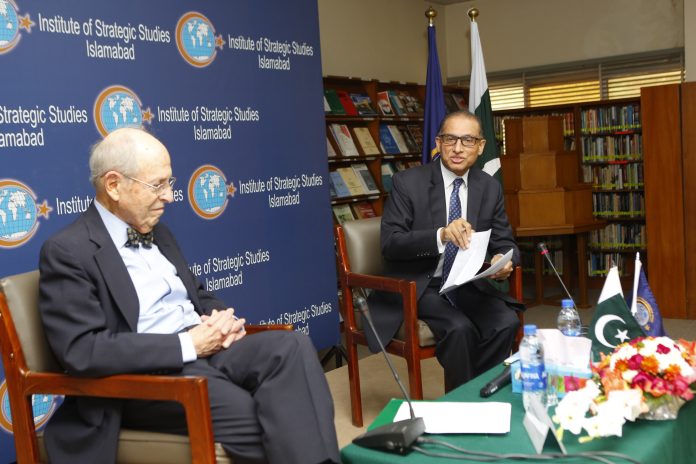Press Release
Public Talk
How Pakistan and the US Can Provide a Plan B for Afghanistan
November 12, 2019
“For the foreseeable future, efforts to achieve a comprehensive, negotiated peace agreement will not be successful. Without a Plan B therefore, Afghanistan is headed towards a chaotic civil war … it will take the international community to make such a Plan B possible but not more so than two countries: the United States and Pakistan”. This was stated by Dr. Marvin G. Weinbaum, Director, Afghanistan and Pakistan Program at the Middle East Institute, Washington, D.C, during his address at a Public Talk on ‘How Pakistan and the US Can Provide a Plan B for Afghanistan.’ The event was organized by the Institute of Strategic Studies Islamabad (ISSI) today under its Distinguished Lecture Series. Policy makers, diplomats, academics and students were present on the occasion.
Dr. Weinbaum said that we have tried a political solution for Afghanistan for the past 10 years based on the premise, strictly speaking, that there is not a military solution, at least one that the international community can guarantee. Plan B is based on a compromised agreement with the Taliban, that features above all, power sharing in which the Taliban in one form or another would be invited to share power. In order to reach this agreement, it was necessary to have extended negotiations. Where until last year, the problem was mainly to make the conflicting parties sit down. Once this was achieved, the Taliban has come to the conclusion: a diplomatic outcome was also possible and it would be in their interest. They have the understanding that the US above all, was very much dedicated to leaving and that the objective to make all forces leave the country was a possibility. They watched as the Afghan political system started to come apart, and they now see that the idea that they could realize their objective, both politically and diplomatically while still maintaining as a requisite military campaign, was also possible. The Taliban have always wanted peace, but peace on their terms, he said.
Dr. Weinbaum also spoke of the nine rounds of negotiations, which he said had nothing to do with peace in Afghanistan since there was no truce and no concessions that would end the conflict. The idea that there has to be a diplomatic solution came about after it emerged that if this conflict goes on, regardless of reaching a side deal between the US and Taliban, the danger of destabilization is very real. He also said that what was particular about the conflict in the 1990s was the unity of command on both sides, which renders the applicability of that scenario to the present situation useless , since neither side has that cohesion. What we have today is an extensional conflict. It is the clashing of irreconcilable values. Plan B necessitates looking at a realistic picture. It is a rededication to the Afghan state and to the strengthening of the state we have lost sight of by thinking there is a shortcut out of this conflict. It must be kept in mind that a chaotic civil war will have an external element in the form of neighboring countries and a radical regime in Afghanistan will energize radical elements in Pakistan. A major incentive for Pakistan is that Afghanistan-India relations depend upon Afghanistan needing a counter-weight to Pakistan. Afghanistan’s reliance on India declines if its own security rises. But all this refocusing cannot happen without the Afghan’s themselves.
Earlier, in his welcome remarks, Ambassador Aizaz Ahmad Chaudhry, Director General ISSI, said that a critical first step towards the peace settlement is a credible intra-Afghan dialogue amongst all political and warring factions in Afghanistan, especially between the two principal stakeholders, namely the Afghan government and Taliban. It is imperative that both parties deliberate on all aspects of the peace settlement, i.e. how to ensure a credible and sustained ceasefire, a responsible and measured withdrawal of foreign forces, a participatory future political set up, and major and regional powers acting as guarantors of the peace. He went on to say that Pakistan and US have a crucial role to play in the future of Afghanistan and Pakistan is convinced of the continuing imperative of urgent resumption of the peace talks.












